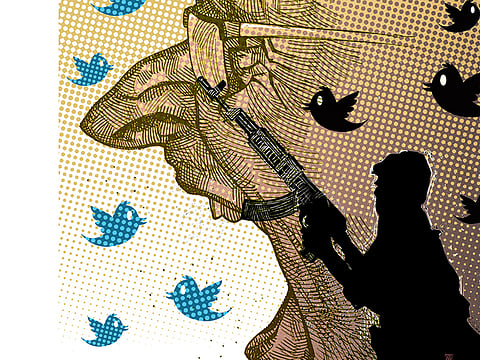‘News laundering’ and terrorism
Though it is not a dominant trend in the media, and can easily be detected and exposed by professional journalists, it’s poisoning the profession

I still remember the discussion in one of the main British media organisations more than two decades ago on how to handle Sinn Fein — the political wing of Irish Republican Army (IRA). This was because it was not appropriate to interview terrorists, and IRA was a terrorist organisation — and though Sinn Fein was not violent, it was still linked to the IRA. Finally, Sinn Fein got through the media after deep discussions among mediapersons. Things have changed since then, and the rising role of social media (SM) has diluted many rules and principles that govern the work of journalists. A new trend has emerged, which is dangerous and amounts to ‘global mass brainwashing’, especially when it comes to covering terrorism and the groups behind it. Recalling lectures about ‘Disinformation’ earlier in my journalistic career, I can see that social media makes spies of the 20th century look like amateurs.
These days, you can easily fabricate a tweet and, through a series of recycling, it ends up as a news story in mainstream media. A vulgar example in our region is the network of social media accounts and websites affiliated with the Muslim Brotherhood, used in its campaign against countries it is active in. It starts with a fabricated lie on social media, and active followers pile comments adding more lies; then one of those pseudo-news websites posts a story starting with “The news all over social media said…” or “Social media activists are sharing the news of…”. This recycled story makes it to one of the mainstream media outlets, which carries such stories, even though they are not substantiated. This is done either for political reasons or just to run an ‘exclusive’. The process is not much different from money laundering: exploiting loopholes to channel illegal money into the financial system to make it look legal. ‘News laundering’ is a convoluted means of getting fabricated news into mainstream media, giving it undeserved credibility.
Spies and media manipulators in the old days exploited the competition among journalists to get exclusive news and planted carefully doctored information (actually disinformation) and half-true stories that seemed like a leak. Nowadays, social media has made their efforts look amateurish. But we should not victimise social media as it also plays a role in disseminating useful information all the time, just as we don’t condemn property investment because many money launderers use it to ‘clean’ their illegal money. Though news laundering is not a dominant trend, and can easily be detected and exposed by professional journalists, it’s poisoning the profession and tarnishing social media. And yet, some are taking news laundering to new extremes, further crossing the boundaries of political propaganda.
More than a decade ago, when the main Arabic news channel at the time broadcast audio and video messages of Al Qaida leader Osama Bin Laden, a heated debate ensued about media ethics and whether that amounted to ‘disseminating terrorists’ messages’ or not. Yet, it was tolerated and that media outlet became the source of ‘terrorists’ news’ for global media. Then, during the Iraq war, coalition countries accused the Arab network of allying with the enemy but many western broadcasters carried its footage from Baghdad. The world turned a blind eye to the production house in Pakistan that produced propaganda material for Al Qaida, and then came social media as a bigger medium to spread such materials.
Reshaping public opinion
Now terrorist groups in Iraq, Syria, Libya and other countries produce high quality videos of their brutalities and post them online. They no longer need to smuggle tapes to ‘friendly’ networks to get their messages through. So, what’s left for media organisations that have political agendas? They still have a role to play. ‘Terrorism laundering’ would be an appropriate term to describe what some of the mainstream media outlets are doing now. Leading campaigns to reshape public opinion towards some terrorist groups, in order to whitewash their ideologies and practices for political ends. And promoting the political argument that ‘terrorists can’t be uprooted by military means only’ — i.e. dialogue is imperative.
This involves precipitating the idea of benign and malignant terrorism, just to start rebranding the benign ones as ‘freedom fighters’ as opposed to the malignant ones. This is far more dangerous and leaves no room for discussing media ethics. That’s pure political propaganda, and should be exposed as such, and dealt with accordingly. News laundering might deceive the public, but people will one day stop trusting sources that tell lies. Terrorism laundering means more recruits and funds to militants and this should be confronted the same way the world scrutinises sources of support for terrorism and terrorists.
Dr Ahmad Mustafa is an Abu Dhabi-based journalist.
Sign up for the Daily Briefing
Get the latest news and updates straight to your inbox



